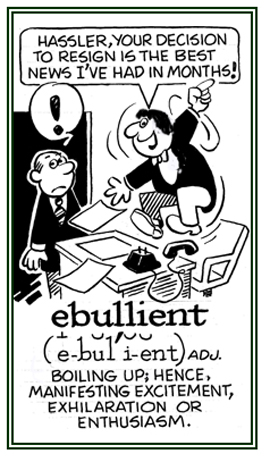ebulli-
(Latin: to bubble, to bubble up; to boil)
ebulliate
To boil or to bubble up.
ebullience
1. Overflowing with enthusiasm.
2. High spirits; exhilaration; exuberance.
3. A boiling over; an overflow.
2. High spirits; exhilaration; exuberance.
3. A boiling over; an overflow.
ebulliency, ebulliencies
A boiling up or over; effervescence.
2. A boiling over.
2. A boiling over.
ebullient (adjective), more ebullient, most ebullient
1. Referring to a substance or liquid which boils or boils out: Tom suddenly noticed that the milk on the stove was quite ebullient and flowing over, so her immediately took it away and turned off the stove.
2. Descriptive of a person or an animal that overflows with enthusiasm, high spirits, etc.; zestful exuberance: Becky was such an ebullient girl because she was so vivacious, effusive, and buoyant and enjoyed her friends so much!
3. Etymology: from Latin ebullire, "to bubble up"; from e-, "out of, from" + bullire, "to bubble, to boil."

© ALL rights are reserved.
Go to this Word A Day Revisited Index
2. Descriptive of a person or an animal that overflows with enthusiasm, high spirits, etc.; zestful exuberance: Becky was such an ebullient girl because she was so vivacious, effusive, and buoyant and enjoyed her friends so much!
3. Etymology: from Latin ebullire, "to bubble up"; from e-, "out of, from" + bullire, "to bubble, to boil."

Go to this Word A Day Revisited Index
so you can see more of Mickey Bach's cartoons.
ebulliently
1. In an ebullient manner.
2. In an energetic, positive, and happy way.
2. In an energetic, positive, and happy way.
ebulliometer
A food or kitchen tool used to determine alcohol content by volume by measuring differences in boiling points between water and alcohol.
The tool is not entirely accurate. In these modern times, wineries have sophisticated chemistry labs and use a gas chromatograph for a more precise measurement of alcohol content by volume.
ebulliometry, ebulliometric
The determination of the average molecular weight of a dissolved substance from the boiling point elevation of a solution.
ebullioscope
An instrument for observing the boiling point of liquids; especially, for determining the alcoholic strength of a mixture by the temperature at which it boils.
ebullioscopic
A reference to an indication of the boiling point of liquids.
ebullioscopy
1. A technique used to determine the relative molecular mass of a substance by measuring the amount by which it alters the boiling point of a chosen solvent.
2. The technique for finding molecular weight: a process for determining the molecular weight of a substance by measuring the change it produces in the boiling point of a solution.
2. The technique for finding molecular weight: a process for determining the molecular weight of a substance by measuring the change it produces in the boiling point of a solution.
ebullire
1. To boil.
2. The following image is one of the most common signs for water through the ages, but it is said that it also symbolized boiling.

2. The following image is one of the most common signs for water through the ages, but it is said that it also symbolized boiling.
This symbol appears both in modern ideography, as an alchemical sign and as an ancient Greek symbol. In eighteenth-century chemistry, it could mean coquere (to cook; to prepare food) or ebullire (to boil).
ebullism
1. The production of gas bubbles in body fluids, arising from the sudden reduction in ambient pressure which may occur in decompression sickness and is a hazard for astronauts on the moon, where there is no atmosphere.
2. The formation of bubbles in body fluids under sharply reduced environmental pressure.
3. Formation of water vapor bubbles in the tissues brought on by an extreme reduction in barometric pressure.
2. The formation of bubbles in body fluids under sharply reduced environmental pressure.
3. Formation of water vapor bubbles in the tissues brought on by an extreme reduction in barometric pressure.
It occurs if the body is exposed to pressures which are found above an altitude of 63,000 feet, or if a diver rises rapidly from a great depth in a water environment to the surface.
ebullition, ebullitions, ebullitional
1. The act of boiling up; sudden outburst; effervescence.
2. An outburst or an unrestrained expression, as of some emotion; such as, an ebullition of anger or ill temper.
3. The act or process of boiling in which a liquid vaporizes rapidly, producing bubbles and turbulent movments.
4. A boiling or bubbling up of a liquid; the motion produced in a liquid by its rapid conversion into vapor.
5. Effervescence occasioned by fermentation or by any another process which causes the liberation of a gas or an aeriform fluid, as in the mixture of an acid with a carbonated alkali.
6. Formerly written as, bullition.
2. An outburst or an unrestrained expression, as of some emotion; such as, an ebullition of anger or ill temper.
3. The act or process of boiling in which a liquid vaporizes rapidly, producing bubbles and turbulent movments.
4. A boiling or bubbling up of a liquid; the motion produced in a liquid by its rapid conversion into vapor.
5. Effervescence occasioned by fermentation or by any another process which causes the liberation of a gas or an aeriform fluid, as in the mixture of an acid with a carbonated alkali.
6. Formerly written as, bullition.
Related indirectly to the "heat, hot" word units: pyreto-; thermo-.
Another "bubbling, boiling" unit: ferv-.
<img src="/img/left_arrow_sm.gif" alt="" /> <img src="/img/right_arrow_sm.gif" alt="" />
Showing 1 page of 13 main-word entries or main-word-entry groups.
